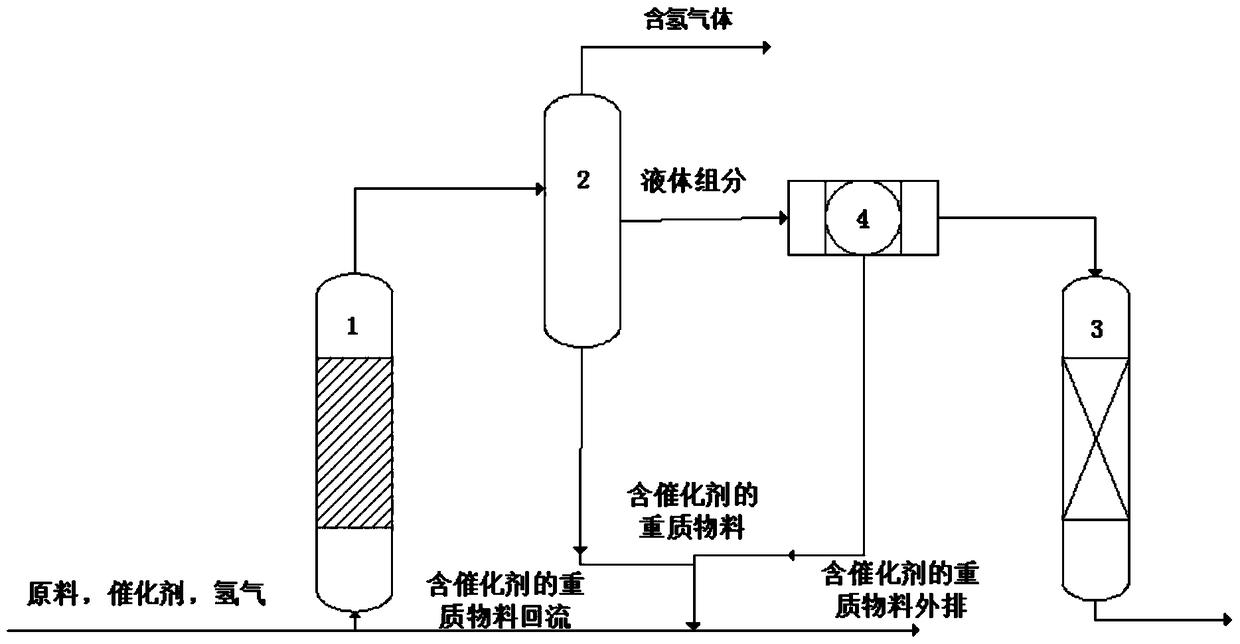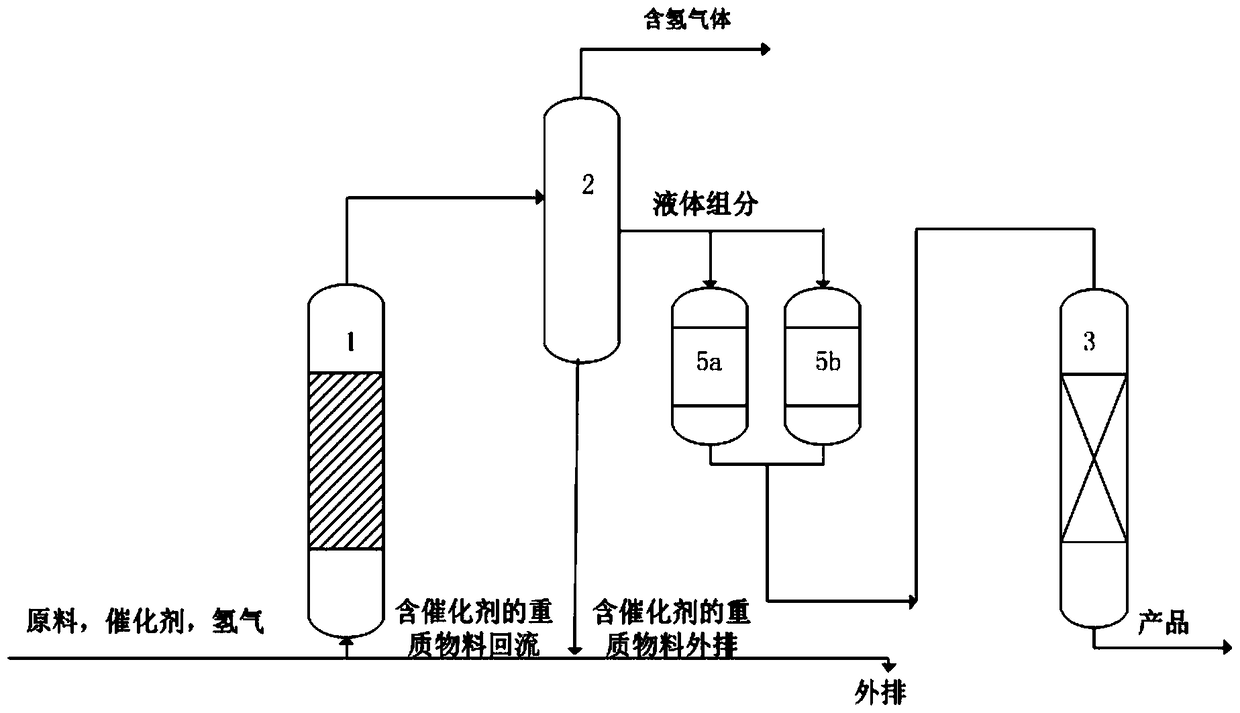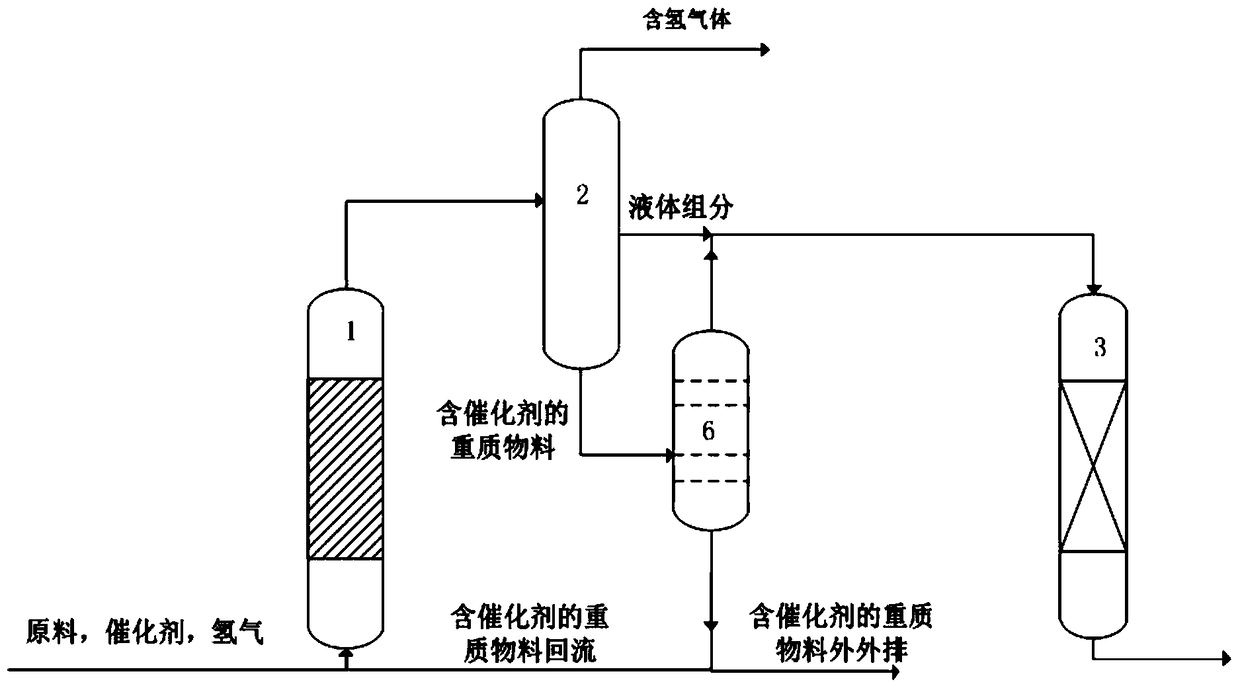A processing method for inferior heavy oil and/or inferior residual oil
A low-quality heavy oil and processing method technology, applied in the petroleum industry, hydrotreating process, hydrocarbon oil treatment, etc., can solve the problems of short operation period, more dry gas, more coking, etc., and achieve high light oil yield, The effect of extending the operating cycle and wide application range
- Summary
- Abstract
- Description
- Claims
- Application Information
AI Technical Summary
Problems solved by technology
Method used
Image
Examples
Embodiment 1
[0071] With A as raw material (properties see Table 1), in the slurry bed reactor with C as catalyst (properties see Table 2), material flow chart as figure 1 shown.
[0072] Grind the catalyst and control the particle size to 100-150 mesh by sieving method, and feed it into the slurry bed reactor 1 from bottom to top along with the raw material and hydrogen at 3.0% by weight of the weight of the fresh raw material oil. The operating conditions for controlling the slurry bed reactor 1 are: temperature 420°C, pressure 10MPa, hydrogen-oil volume ratio 1000, space velocity 0.2h -1 . The conversion depth of the material at the outlet of slurry bed reactor 1 is shown in Table 3. The material enters the high-pressure separator 2 from the slurry-bed reactor 1, and the operating conditions of the high-pressure separator 2 include a temperature of 380° C. and a pressure of 10 MPa.
[0073] The liquid component obtained by the material passing through the high-pressure separator 2 an...
Embodiment 2
[0077] Taking B as raw material (see Table 1 for properties), and taking D as catalyst (see Table 2 for properties) in the slurry bed reactor, the material flow chart is as follows figure 1 shown.
[0078] Grind the catalyst and control the particle size to 120-180 mesh by sieving method, and feed it into the slurry bed reactor 1 from bottom to top along with the raw material and hydrogen at 5.0% by weight of the weight of the fresh raw material oil. The operating conditions for controlling the slurry bed reactor 1 are: temperature 380°C, pressure 12MPa, hydrogen-oil volume ratio 1500, space velocity 0.1h -1 . The conversion depth of the material at the outlet of slurry bed reactor 1 is shown in Table 3. The material enters the high-pressure separator 2 from the slurry-bed reactor 1, and the operating conditions of the high-pressure separator 2 include a temperature of 390° C. and a pressure of 9 MPa.
[0079] The liquid component obtained by the material through the high-p...
Embodiment 3
[0086] With A as raw material (properties see Table 1), in the slurry bed reactor with C as catalyst (properties see Table 2), material flow chart as figure 2 shown.
[0087] Grind the catalyst and control the particle size to 200-240 mesh by sieving method, and feed it into the slurry bed reactor 1 from bottom to top along with the raw material and hydrogen at 6.0% by weight of the weight of the fresh raw material oil. Control the operating conditions of slurry bed reactor 1 as follows: temperature 400°C, pressure 10MPa, hydrogen-oil volume ratio 1000, space velocity 0.2h -1 . The conversion depth of the material at the outlet of slurry bed reactor 1 is shown in Table 3. The material enters the high-pressure separator 2 from the slurry-bed reactor 1, and the operating conditions of the high-pressure separator 2 include a temperature of 380° C. and a pressure of 10 MPa.
[0088] The liquid component obtained by the material through the high-pressure separator 2 and the gua...
PUM
| Property | Measurement | Unit |
|---|---|---|
| particle size (mesh) | aaaaa | aaaaa |
Abstract
Description
Claims
Application Information
 Login to View More
Login to View More - R&D
- Intellectual Property
- Life Sciences
- Materials
- Tech Scout
- Unparalleled Data Quality
- Higher Quality Content
- 60% Fewer Hallucinations
Browse by: Latest US Patents, China's latest patents, Technical Efficacy Thesaurus, Application Domain, Technology Topic, Popular Technical Reports.
© 2025 PatSnap. All rights reserved.Legal|Privacy policy|Modern Slavery Act Transparency Statement|Sitemap|About US| Contact US: help@patsnap.com



